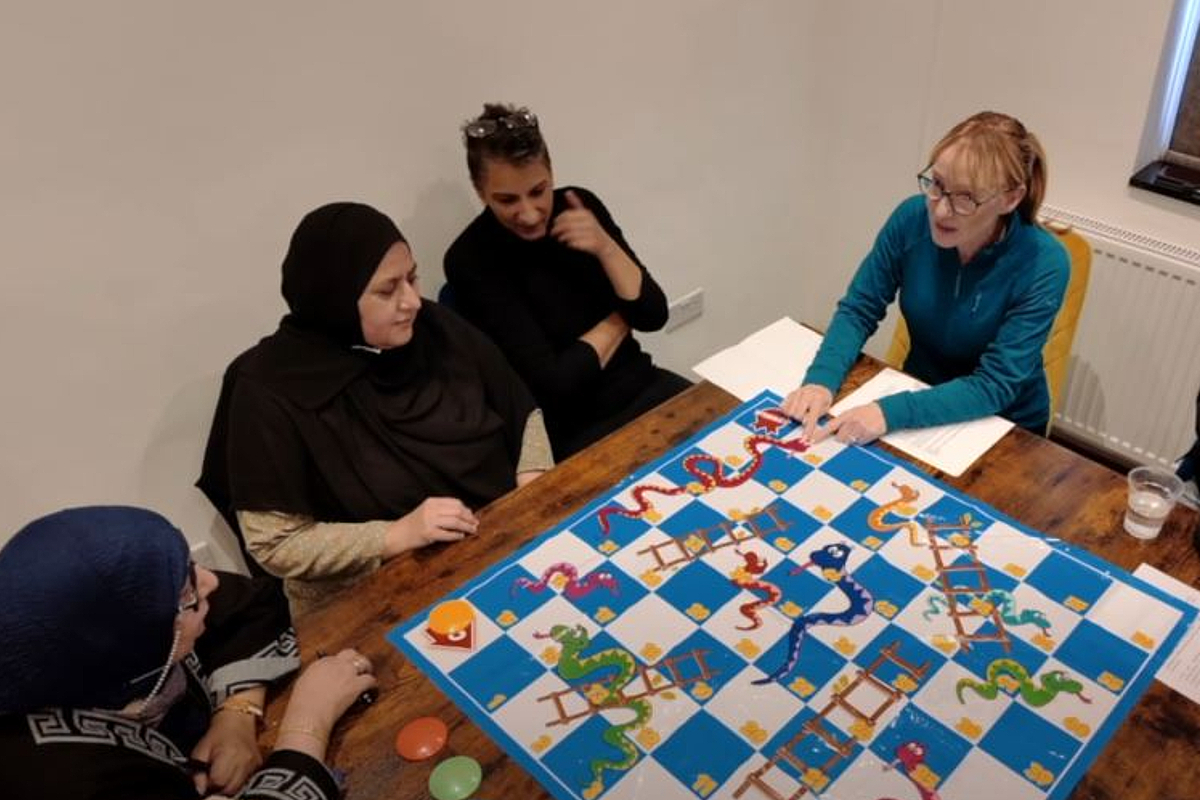15 Jan 2025
Engaging with our communities across Greater Manchester as part of the Health Innovation Accelerator programme

The Health Innovation Accelerator has been established to rapidly improve the diagnosis and treatment of disease across the 2.8m Greater Manchester population. The Accelerator encompasses two projects, the Advanced Diagnostics Accelerator and the DEVOTE programme, delivered through a partnership between Health Innovation Manchester, Manchester University NHS Foundation Trust (MFT), The University of Manchester, and industry partners.
Through these programmes of work, the Accelerator is addressing several diseases including liver, heart and lung disease, by using academic, clinical and industry excellence to better understand data, digital tools and innovative point of care testing to improve health outcomes for patients.
Public and Patient Involvement and Engagement (PPIE) is a key component of the Accelerator, with the overall aim of empowering the public to engage in focus group discussions, co-creation sessions, creative campaign design, peer led interviews and observing people in their own environment to understand their experiences, perspectives and everyday practices.
This approach amplifies the voice of these communities enabling them to share their lived experience. By doing so, the programme and our local health and care system can gain valuable insights to improve access and uptake of advanced and community-based diagnostics amongst underserved groups moving forward.
The South Asian community accounts for 15.5% of the total population across Greater Manchester. In some localities the proportion of people from South Asian backgrounds is even higher, with Rochdale being an example of this with around 19% of the total population being of South Asian ethnicity.
Approximately 89% of Asian or British Asian residents living in Rochdale are currently living in deprived areas compared to 67% of White British residents, with research from Oxford University finding that “ethnic background and social circumstances” are crucial factors in health. The study also found that British Bangladeshi men have the highest rates of lung cancer in England.
Rochdale: engaging with our communities across Greater Manchester
As part of the public and community engagement work that is being undertaken as part of the Health Innovation Accelerator programme, Health Innovation Manchester recently travelled to Rochdale to meet with a non-profit organisation called Awakening Minds, a specialist Punjabi service providing community-based mental health support to the local South Asian community.
The session provided an opportunity to address the health inequalities identified by the community. Using a “snakes and ladders” theme, we explored and gained insights into the barriers and enablers affecting the South Asian community and the health and care system.
The discussion focussed on potential ways to increase engagement with the community in terms of access to NHS screening and raising awareness of health risks associated with prevalent disease in this community.
Through conversation and active listening with members of Awakening Minds, we were able to learn more about their experiences, their needs, and perspectives on how the health and care system can better engage with diverse communities across Greater Manchester.
Nasrine Akhtar, Founder of Awakening Minds, said: “99% of the battle is understanding the person, the faith, the culture, the community, the feeling, the experiences, the trauma, the history. We’re here because of our experiences and we want to make things better. So, what can you do? Do what you’re doing now, ask us, listen to us, talk to us. We’re not hard to reach, come to us. We want to live longer, we want to stay happier, we want to be healthy, we want our children to thrive, and we want our families and communities and the nation to thrive.”
Nicky Timmis, Public and Patient Involvement and Engagement Manager at Health Innovation Manchester, said: “The Innovation Accelerator is all about tackling health inequalities and levelling up but, we can’t deliver this in isolation from the people, patient groups and communities most affected. So, public involvement and engagement is a cross-cutting theme, the golden thread throughout this programme and this will provide some of the insights and learnings that can help us links all the projects together.
“Meeting up with Nasrine and members of the Awakening Minds community was an absolute pleasure, and its collaborations like this that are helping us to influence positive change across our programmes of work. Community engagement is all about empowering our communities across Greater Manchester to tell us more about their needs, their experiences and how they feel that we can all work together to improve care given to the millions of people across our region. This work would not have been possible without the support, guidance and expertise of voluntary sector organisations like Awakening Minds.”
The Health Innovation Accelerator
The Health Innovation Accelerator encompasses two projects, the Advanced Diagnostics Accelerator and the DEVOTE programme, delivered through a partnership between Health Innovation Manchester, Manchester University NHS Foundation Trust (MFT), The University of Manchester, and industry partners.
This project is part-funded by the Greater Manchester Innovation Accelerator programme. Led by Innovate UK on behalf of UK Research and Innovation, the pilot Innovation Accelerators programme is investing £100m in 26 transformative R&D projects to accelerate the growth of three high-potential innovation clusters – Glasgow City Region, Greater Manchester and West Midlands. Supporting the Government’s levelling-up agenda, this is a new model of R&D decision making that empowers local leaders to harness innovation in support of regional economic growth and help attract private R&D investment and develop future technologies.



